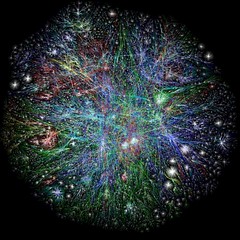I recently had the opportunity to see Adrian Ho of Zeus Jones speak. His firm does exceptional things in marketing that are non-traditional and approach social marketing in a way that is seemingly at odds with many of the “Best practices” floating around. Here’s the video and below that is the slide deck. Continue reading “Social media without conversation”
Is there a future in Flash?

- Image by gahlord via Flickr
I was recently asked by a marketing student at one of Burlington Vermont’s several colleges whether she should spend the time learning to make things in Flash. This post is my attempt to provide some guidance. If you have some useful information or feedback, please don’t hesitate to use the comments section.
With the latest shiny object released by Apple without support for Flash, there’s been a lot of conversation about the future of Flash. But there are much larger wheels in motion than the Flash/Apple situation. But examining the future Flash does make for an interesting and useful lens on the direction of several technology trends currently in play.
Preliminary statement of bias: I enjoy making Flash projects and have been involved with the platform since I first entered Stuart Butterfield’s 5k competition back in 2000. But I’ve also been heavily involved in search marketing activities, where Flash can really mess things up.
Initial observations about Flash and online marketing
Let’s look at a couple observations that I think are relevant to the future of Flash: Continue reading “Is there a future in Flash?”
GPS
- GPS
- GPS is an acronym for Global Positioning Satellite. Devices with GPS built-in are aware of their location on the surface of the earth. This information can be useful in augmented reality systems because it allows the AR system to know what the “real” reality of the device is, pull in correlating data (like nearby map features, weather, other GPS data encoded objects and so on). In conjunction with a compass, GPS can have a sense of what direction the device is facing–perhaps enough to place useful data or artwork into a live video overlay.
- GPS-based AR applications require the system to know the location of the viewer, usually approximated as the location of the device used to run the AR application. This is in contrast to Glyph-based AR application, which require possession of a Glyph to display the data or augmentation.

Meta-description
- Meta-description
- One of the meta tags, in the HTML header of a web document that contains a brief description of the contents of the document itself. The meta-description is not normally visible in a web browser while viewing the page it describes–one must “view source” to see it.
The meta-description is visible on a SERP, however. It is often the bit of text below a link on the SERP. Meta-description is not believed to influence the positioning of a page on a SERP, but it may inflence whether a human wants to click the link above it. As such, meta-description is a curious SEO tag that doesn’t focus on machine algorithms but instead effects human factors of search engine optimization.
Facebook changing business pages
Just a quick heads up that Facebook is changing some things about business pages. Here’s a slide deck to help you adjust:
Thoughtfaucet Business Cards Series r2 (W00t! for Moo.com)

I love it when I get a new shipment of business cards from Moo.com. It’s like Christmas for me. I like it for a few reasons:
- It means that I’ve talked about my business with more than 100 people: my business card count is a metric for my off-line promotional activities.
- I get to see what the new cards look like, since I redo the batch of cards each time.
This is my second order in the past 10 months. My goal for this year is Continue reading “Thoughtfaucet Business Cards Series r2 (W00t! for Moo.com)”
Gahlord Dewald teaching an Interactive Web Design Course through Burlington Public Schools Continuing Education

- Image by curiouslee via Flickr
Thoughtfaucet President/Janitor, Gahlord Dewald, will be teaching an introductory web design course for Burlington Public Schools this spring. The class is 10 sessions, from 6pm to 9pm on Thursdays starting February 4, 2010. The class meets at Burlington High School and is open to all ages.
This class will be helpful for:
- Company employees tasked with updating and maintaining the company website.
- Small business owners looking to make their own website
- Anyone considering a career in web design
- Workers who want to get a better understanding of how to make sites rank better in search engines (aka SEO)
- Hobbyists and students who want to know more about how the web works
The goal is to get to be able to design and code functional website by the end of the course. Students will be using the same tools for web design and development as professionals. The class will make use of the Burlington Technical Center’s Careers in Design and Illustration Mac lab. All of the tools used have PC equivalents, so don’t be too frightened if you’ve never used a Mac.
Topics covered include: Continue reading “Gahlord Dewald teaching an Interactive Web Design Course through Burlington Public Schools Continuing Education”
Why Apple’s new creation will be free.

- Image via Wikipedia
[Update: I was, of course, wrong. iPad costs $500-$800 depending on configuration options, data plans are $15 or $30 per month depending on download volume, data contracts can be canceled any time–no lock in on them.]
I think the new iTablet/iSlate/iPad thing will be free.
All the current predictions for something that’s supposed to be a game-changer seem really tame to me: “it’s going to be somewhere between the size an iphone an laptop” or “it’ll have wifi and 3G” or “it’ll have multi-touch.” I mean really. That doesn’t sound game changing. So here’s my take on Apple’s creation and why it’s going to be free. Continue reading “Why Apple’s new creation will be free.”
Papervision3D
- Papervision3D
- A Flash code framework for making simple three-dimensional (3D) art on the web. Many augmented reality systems use this framework to present artwork mapped to an AR glyph.
SERP
- SERP
- Acronym of Search Engine Result Page. This is the page that a search engine displays after a person types their keyword into the search engine.
- The goal of most search engine optimization campaigns is to appear higher on the SERP, in the belief that the first result is the one that searchers most often click.
